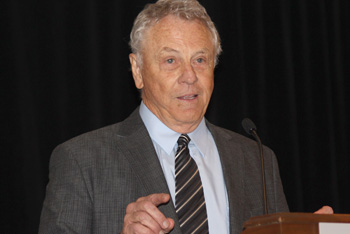
Morris Dees, renowned civil rights attorney and keynote speaker at the Litigation, Dispute Resolution, and Appellate Practice Institute, says “We all take the pledge, ‘one nation with liberty and justice for all.’ But what does that mean for lawyers in a changing America? What are today’s issues?”

Morris Dees (left) with Institute Planning Committee and Litigation Section member Tim O’Brien.
To see photos from the Litigation, Dispute Resolution, and Appellate Practice Institute, visit the State Bar of Wisconsin’s Facebook page, or click here.
May 17, 2013 – Renowned civil rights attorney Morris Dees reminds lawyers they hold the key to the gates of justice, and everyone deserves a seat at the table. Dees spoke yesterday to attendees at the State Bar of Wisconsin PINNACLE® Litigation, Dispute Resolution, and Appellate Practice Institute, which concludes today.
Dees is chief trial counsel for the Southern Poverty Law Center (SPLC) in Montgomery, Ala. He has won multimillion-dollar settlements against opponents like the Klan and the Aryan nations. Dees spoke for tolerance and against prejudice as he reviewed America’s commitment to “justice for all” as the nation becomes more diverse and economic disparity widens.
“We are dealing with a lot of issues today concerning immigrants – mainly Latinos,” said Dees. “They are a great part of the workforce that produces products that the American people want, and we don’t have enough people to fill those jobs.
Noting that his original inspiration to stand up for others rights came from a grammar school teacher in a small country school in rural Montgomery, Ala. “Mrs. Vera Belle Johnson wanted us to grow up to be good citizens,” he said. That’s where Dees first heard the words, with liberty and justice for all. “There wasn’t much she could do about segregation, but she did tell us in her own way how she felt the ‘colored’ people, as she called them, were not being treated fairly.”
“When I grew up in that small community I didn’t understand diversity. I didn’t understand why America is great because of our diversity. It was just the black people who worked in the fields and the white people who owned the land. I guess I was fortunate that my family didn’t own any land, so I had the chance to work in the field and get to know the black people I worked with as people, one on one.”
Deb Heneghan is the publications reporter for the State Bar of Wisconsin. She can be reached by email at or by phone at (608) 250-6135.
Dees is inspired by the courageous judges and juries. He recalled an African American judge in Oregon who “bent over backwards to give a Neo Nazi group a fair trial.” He noted a particular jury from a small community “who felt that if they ruled for us [SPLC] they would not be very popular when they went back to their homes.” But they stood up and did the right thing.
He recalled the case of the Vietnamese fishermen who were attacked by the Ku Klux Klan when they began outfishing American fishermen in Texas, and the case of Mike O’Donnell, the only son of a woman who forgave one of his Klan killers. He recalled Marine Sgt. Roy Patterson from Georgia, a decorated Vietnam veteran who was bullied by state troopers after not having done anything wrong.
“One of the troopers pulled his pistol and hit Patterson over the head with it,” said Dees. “Patterson took the gun away and shot and killed both troopers. I remember that jury of six whites and six blacks. Avoiding the death penalty was almost an impossibility. Those six black jurors held out for four days in deliberation and refused to execute Patterson. Under Georgia law a deadlocked jury is an acquittal of capital murder. Finally, after working on this case for 12 years, during which time Patterson was in prison as a convicted murderer, he walked out a free man. This was on behalf of the tremendous effort of a pro bono lawyer who stood up and time and time again. At the beginning of the third trial they decided to let him go.”
Dees described the Vietnamese fishermen who stood up (thanks to the urging of Dees and the SPLC) to the KKK and won. He described the faces of the people the day they held their blessing and launched their boats and the faces of the U.S. marshalls standing behind them in support. “I saw enormous pride as they gained a place at America’s table. Everyone needs a place at the table.”
“We have yet to win a hate group case without some members of the organization we were suing becoming our star witnesses,” says Dees. He believes that if most of the people in these organizations had been contacted by a good Boy Scout leader, gotten involved in some type of community service, or gotten the right mentoring in school things would have been different for them. “I find a lot of these people are smart. They want to be recognized, they want leadership. They think someone has taken something from them that they should have had. But I think that one of the biggest jobs we have to do is we must not turn our backs on people that disagree with us. We must try to build some bridges instead of barriers.”
Lawyers who take SPLC cases accept them pro bono. As lawyers, we hold the key to the gates of justice, and everyone deserves a seat at the table, he said.
The next institute, Real Estate and Business Law Institute on June 13 and 14 in Middleton, is held in conjunction with the swearing in of Patrick Fiedler as the 58th State Bar president.
Related
